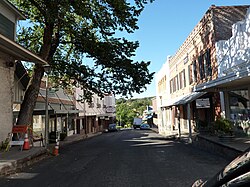San Andreas, California
| San Andreas | |
|---|---|
| Census-designated place | |

Main Street
|
|
| Location in the United States | |
| Coordinates: 38°11′46″N 120°40′50″W / 38.19611°N 120.68056°WCoordinates: 38°11′46″N 120°40′50″W / 38.19611°N 120.68056°W | |
| Country |
|
| State |
|
| County | Calaveras |
| Area | |
| • Total | 8.394 sq mi (21.741 km2) |
| • Land | 8.378 sq mi (21.700 km2) |
| • Water | 0.016 sq mi (0.041 km2) 0.19% |
| Elevation | 1,017 ft (310 m) |
| Population (2010) | |
| • Total | 2,783 |
| • Density | 330/sq mi (130/km2) |
| Time zone | Pacific (PST) (UTC-8) |
| • Summer (DST) | PDT (UTC-7) |
| ZIP codes | 95249-95250 |
| Area code(s) | 209 |
| FIPS code | 06-64420 |
| GNIS feature IDs | 277590, 2409247 |
| Reference no. | 252 |
San Andreas is an unincorporated census-designated place and the county seat of Calaveras County, California. The population was 2,783 at the 2010 census, up from 2,615 at the 2000 census. Like most towns in the region, it was founded during the California Gold Rush. The town is located on State Route 49 and is registered as California Historical Landmark #252.
Settled by Mexican gold miners in 1848 and named after the Catholic parish St. Andrew, the town has been a noted mining camp since early days. The gold from the initially discovered placers gave out after a few years, but the discovery of gold in an underground river channel in 1853 revitalized the camp and it soon became a town. Mining of the channels was lucrative enough for the town to completely rebuild after fires in 1858 and 1863. The gold discovered here contributed greatly to the success of the Union during the Civil War. In 1866, San Andreas became the seat of Calaveras County. It was said to be a rendezvous location for Joaquin Murrieta. Notorious highwayman Black Bart was tried here and sent to prison.
The post office was established in 1854.
According to the United States Census Bureau, the CDP has a total area of 8.4 square miles (22 km2), of which, 99.81% is land and 0.19% is water.
...
Wikipedia

